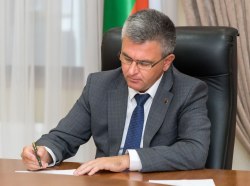The Supreme Council has reconsidered today a number of republican budget items vetoed by the head of state. The relevant committee had already discussed this issue and recommended parliamentarians to override the veto and pass the original version of the law.
Presenting the president's position, the finance minister, Irina Molokanova, noted that taking into account the current dynamics of budget revenues and economic situation, in 2016 the budget may receive about 1.4 billion roubles, «which is 1.2 billion less than the amount 'declared' when considering in the Supreme Council». This is due to a decrease in business activities by domestic economic agents and, as a result, a reduction in budget revenues. Thus, in the 1st quarter of 2016 republican and local budgets received 76 million roubles less than in the same period of 2015.
In this connection, the president thinks the budget parameters drafted by MPs to be ungrounded.
The minister noted that there are already difficulties with financing public sector wages. In the 1st quartet the finance ministry had to take up a 50 million-rouble bank loan for this purpose. Also in this period wages were paid at an amount of 175 million roubles out of 642 million roubles of annual loan volume.
At the same time, such items as procurement of medications and food were not funded. «As of 20 April 2016, arrears on medications amounted to 7.3 million roubles, arrears on food to 14.1 million roubles," reads the veto's substantiation.
With regard to the above mentioned facts, the president had proposed to exclude some articles of the 2016 budget law and to amend some other articles, bringing them to accord with the existing economic situation.
Answering deputies' question about the government and president's stance on the withdrawal of state-run enterprises' profits, Irina Molokanova underscored that under difficult conditions the state had to increase a share of withdrawn profits. But the amount included by MPs in the budget raised more questions in this respect. Thus, according to the law's article, the Social Stabilising Fund will derive revenues from a share in the profits of state unitary enterprises, as well as closed and open joint stock companies partially owned by the state, at amount of 176,606,397 roubles. Irina Molokanova noted that those enterprises would not able to finish the fiscal year with such profits as in 2015 the net profits of those entities had amounted to 26,837,100 roubles, which was 6.5 times below the amount included by the Supreme Council.
Commenting on the possibility of the state fulfilling its social liabilities throughout the year, the minister said that there were enough funds to pay salaries and pensions, but other expenditures, including the procurement of medications and food products, would be financed with whatever funds remained, and added that today's voting would not influence this situation in any way.
«Regardless of today's voting, the budget will not receive this money. Whether they will be put down on paper or not will not change the situation," noted Molokanova in this regard.
The head of the relevant committee recalled in his speech that the budget had been unbalanced from the very beginning. He spoke about the factors influencing the current economic situation, pointed out at the high tax burden and highlighted the necessity of making state funds more transparent.
«It is necessary to adopt the whole complex of measures and, if the budget revenue target is not executed, we'll discuss it when summing up the results of 2016," said Martynov, admitting that if those measures were not implemented, the budget would fall short of money.
At the same time, government officials underscored that the execution of many amendments made by MPs was not possible a priori. In particular, it was noted that the State Customs Committee could not in any way influence the Ukrainian government's decision to put a ban of the importation of excisable goods to Pridnestrovie, and decreasing the country's foreign trade turnover by over 22% as compared with 2015 and reduced customs tariff rates would not double revenues from foreign economic activities, as it is projected by deputies.
In the course of debate, people's deputy Oleg Khorzhan admitted the soundness of the proposals made by his colleagues, but also doubted the possibility of executing them. In this connection he requested the country's leadership to give MPs an opportunity to implement their projects «by appointing them to the corresponding governmental positions».
Deputy Andrey Sipchenko, in turn, called on MPs to back a version proposed in the presidential veto's preamble, based on merely economic point of view.
«Approving increased revenues, we will not change anything in the way the budget can be replenished, but bring someone an opportunity to relax and increase some expenditure items," said Sipchenko.
The majority of lawmakers, in the meantime, voiced the opposite opinion, proposing to override the president's veto. Finally, the Supreme Council adopted individual budget items in the original version approved at a plenary session on 13 April.








